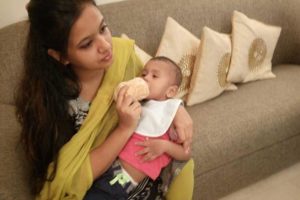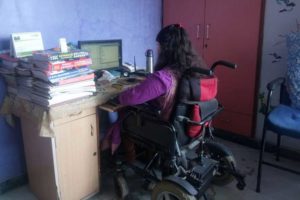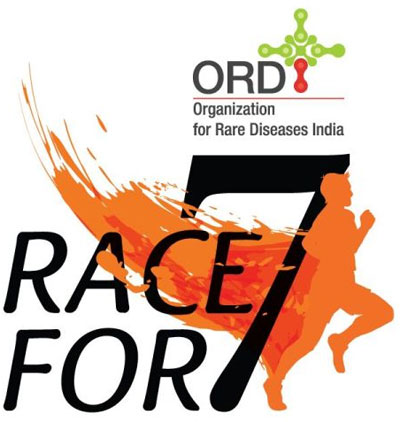 He will turn two this October, but unlike other children his age Baby Haadi cannot sit up, make noises or eat.
He will turn two this October, but unlike other children his age Baby Haadi cannot sit up, make noises or eat.
The little boy’s growth is severely delayed as he suffers from Maple Syrup Urine Disease (MSUD) – a genetic disorder which affects one in 1,85,000 newborns in the world.
Because of his condition Baby Haadi can have only a low-protein diet; which means he cannot have milk, egg, meat or any other protein-rich food. The lack of protein has delayed his physical and mental growth.
“If we don’t calculate the right amount of protein in his diet, he may even die. He needs to take routine protein level tests. Once we send his samples to Bangalore, the result takes almost 15 days,” says Misbah, his mother.
After much research, Misbah and her husband came across a special milk available in the US. “The milk which we import costs us Rs 70,000 for 12 cans which last for two months. It’s not available in India,” Misbah says. “A Delhi hospital said there is no treatment available here, so you may think about your next child and leave Haadi on his own.
MSUD, and over 7000 other such diseases are known as ‘rare diseases’ based on how less prevalent they are. Nearly seven crore Indians live with such conditions and yet, there is no health policy in India that defines a rare disease. Consequently, rare diseases do not come under any health insurance coverage. For most of these diseases, drugs have to be imported from the West, often leaving families with little savings.
Unlike in the US and a few other Western countries, there is no screening of newborns at Indian hospitals for 56 treatable rare diseases, often leading to a delayed
https://healthsavy.com/product/valtrex/
diagnosis, or even more dangerously, a misdiagnosis. This has prompted an online petition urging Prime Minister Modi, Union Health Minister JP Nadda and state governments to recognize Rare Diseases and frame a health policy.
 Meryl Sarah Mammen, a 26-year-old post-graduate in psychology in Ghaziabad has been diagnosed with Pompe Disease, a rare inherited disorder which afflicts certain organs and muscle tissue.
Meryl Sarah Mammen, a 26-year-old post-graduate in psychology in Ghaziabad has been diagnosed with Pompe Disease, a rare inherited disorder which afflicts certain organs and muscle tissue.
Meryl has been on a wheel-chair over the last four years. Two years after the symptoms started, she started losing muscle strength in her legs. She was in Class 8 then and had to drag her feet to take a step forward.
Lack of awareness even among the medical fraternity meant doctors misdiagnosed the disease, worsening Meryl’s condition. “People look at me and ask if I have polio,” she says.
An expensive drug imported from the US, costing Rs 2.6 crores a year, is infused into her body twice a week. Luckily for Meryl, her father’s employer, ONGC, bears the cost of the patented drug.
But not everyone has such financial support.Prasanna Kumar Shirol, co-founder of Bangalore-based Organisation For Rare Diseases India (ORDI) who started the Change.org petition, says the average diagnosis period for any rare disease is seven years.
Shirol says many patients die as they cannot afford the treatment . “Only a rare diseases policy can help the patient community in India because that can take care of the holistic management of patients,” he says.
A rare disease policy would make it financially attractive for pharma companies to invest in this sector. With many countries in the West adopting rare diseases as a health priority, the onus is now on the Centre. If it is serious on its commitment to universal and equitable health care.
Source: https://www.news18.com/news/lifestyle-2/why-people-with-rare-diseases-are-writing-to-pm-modi-1265196.html
 He will turn two this October, but unlike other children his age Baby Haadi cannot sit up, make noises or eat.
He will turn two this October, but unlike other children his age Baby Haadi cannot sit up, make noises or eat.



